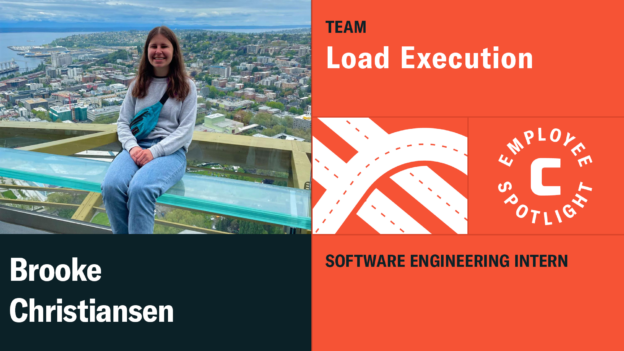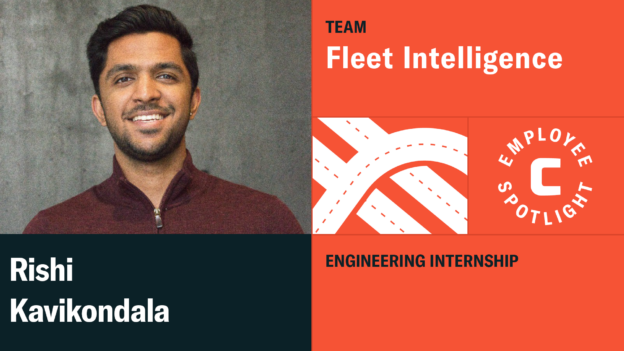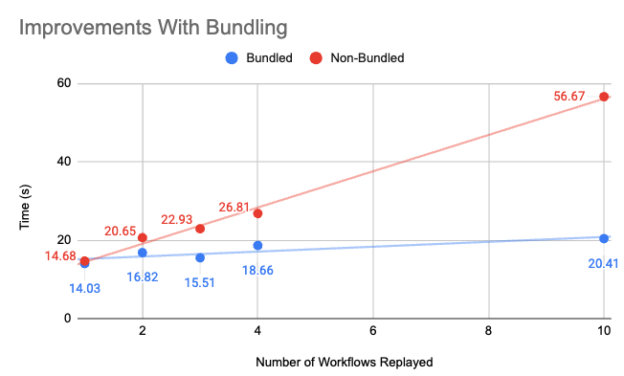Why I joined Convoy from a Big Tech Company
Behind the Scenes • Published on June 11, 2019
Eight months ago, I made one of the biggest and scariest decisions of my career by far. I quit my stable job at a big tech company and joined a series C trucking startup. Yup! Trucking. You read that right!
By the time I left, I had been at Microsoft for 5 years and left at my prime time! It was very confusing to my manager, to my family and friends, and quite frankly to myself sometimes. It was a difficult decision, partly rationalized and partly a leap of faith.
I get asked all the time, “Why did you leave Microsoft? And are you happy now at Convoy?” The short answer is that I am the happiest I have ever been in my career. As to why I left Microsoft to join a startup and why I joined Convoy specifically, this is a much longer answer that unfolds in my story.
Why I wanted to leave?
The reasons that led me to leave are not unique to Microsoft or to me. I hear similar stories from colleagues who left big tech and joined startups as well.
Microsoft holds a special place in my heart. It was a dream come true to work there, and I am grateful for everything I learned during those years. I loved being a part of such a large company with a big vision and almost endless resources. I worked in different orgs and grew my career to a senior engineer. From the outside, it looked like I had it all.
On the inside, Microsoft and my team were becoming a comfort zone to me. I knew the system, the tech stack, and team dynamics, but I was not challenged in the ways I wanted. As a frontend engineer, I wanted to work more closely with customers, which wasn’t always feasible. I was afraid of getting disconnected from the fast and ever-changing frontend ecosystem outside of Microsoft. I always wondered if I am developing the right skill set and staying up to date with the rest of the industry.
I started to entertain the idea of switching teams within the company to learn something new. Then I thought I might as well look outside of Microsoft to see what the world has to offer. I wasn’t sure where I was headed, but I knew I was ready for a refresh.
What I wanted next?
When I started preparing for interviews and exploring opportunities, the most obvious option was to try another tech giant. It was common to see engineers in my network hop between big tech companies for amazing company perks, better compensation, and even a promotion sometimes. Then why should I bother considering startups?
I had to be honest with myself about the goals of this career move. What do I want to achieve? So would a startup or a big tech company align better with these goals? I came up with this list:
• I care a lot about the team, the culture, and the ability to contribute to them.
• I want to work very closely with customers, designers, and PMs.
• I want to solve interesting business problems rather than making engineering breakthroughs.
• I am craving a fast paced environment with lots of experimentation, where customer feedback constantly drives product improvements.
• I am prioritizing learning and making an impact over compensation and company perks.
• I want to work with a modern stack and use more open source technologies.
• I can take some reasonable risk if I strongly believe in the company.
In the light of this list, I started having many conversations with engineers at startups and big companies to understand what I would get from each.
Why a startup and not Big Tech?
In a tech giant, unless you are very lucky to land on a super small and influential team — which I was lucky to experience at Microsoft — you may struggle to measure your impact. Being a small cog in a big machine, you could easily lose sight of the bigger picture. At big companies, you get enormous scale. A feature you build or a bug fix could impact millions of customers, but you may still feel very disconnected from the customers. Moreover, scale often comes with a significant cost on innovation and speed. Creating something new, changing the way the company operates or influencing the culture feels like trying to steer the Titanic. At scale, you have to be more careful — and that probably means slower — because your mistakes and failures are also at scale. It is more expensive to experiment with new ideas and fail. And if you factor in the complex org structures and the amount of process and politics involved, you get how frustrating it can be.
At a startup, your ownership and impact span way more than a feature or a small part of a big project. You get to wear different hats and influence the end to end product. In one project, you work with PMs and data scientists to define requirements and success metrics, collaborate with engineers on your team or cross-org, create experiments, and measure impact. Most importantly, you are working very closely with customers and iterating quickly to find success. You fail and recover quickly. Your skill set scales in different ways, and you learn to adapt and reinvent yourself every day. There is so much work to do and opportunity to go after, but not enough people to do it. If you are passionate about a problem space, even if it is not technical or not in your team/org, you are empowered to go ahead and fix it!
If you would like to visualize it, imagine you were a professional Olympic swimmer. Moving to another tech giant would be like learning to do a breaststroke or breaking a new record time in the butterfly stroke. On the other hand, moving to a startup would be like learning to do swimming, snorkeling, surfing, diving, parasailing, and Ironman triathlons.
Having this comparison in mind, combined with my goals, made it very clear that I should consider startups even more than big tech.
Why Convoy?
I interviewed at a few companies where I believed my goals will be fulfilled and my learnings maximized, but I was open to be surprised by some companies. I got offers from 3 startups at different stages and sizes, some even on the verge of IPO, but I still picked Convoy. Why?
Perfect company stage
I wasn’t sure how to evaluate the risk and reward of joining a startup and what startup stage would give me the experience I was looking for. The VP of engineering at Convoy shared with me this graph, which helped me a lot in the decision making.
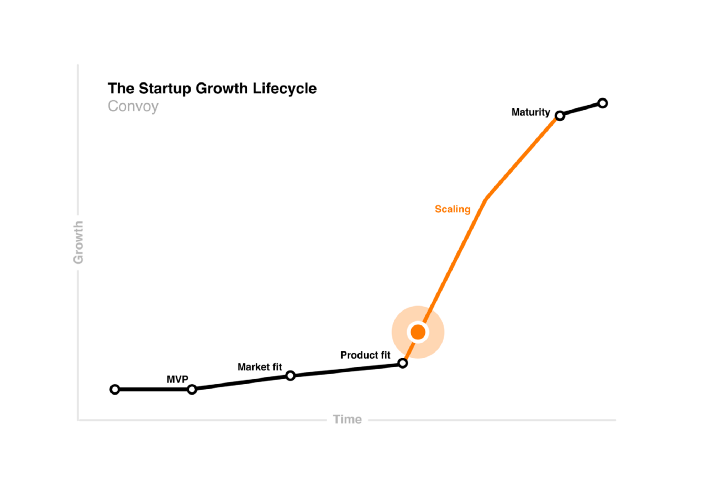
Looking at this graph, it was clear that Convoy is going through an inflection point toward hyper-growth. The company has just passed the point of extreme risk and is shifting gears to start growing rapidly — a priceless time to join. From an experience standpoint, I could learn a lot if I join as the company scales. And financially, it was a balanced risk/reward compromise as Convoy could potentially double, triple, or even 10x in size, market share, and valuation.
I eventually had to ask myself a difficult question. What would I regret more, staying at a big company or leaving for a startup?
I immediately knew that if I missed the experience that comes from joining a startup at hyper-growth, I would definitely regret it more.
Incredible engineering talent
One of the common fears and misconceptions about leaving a big tech company and going to a startup is leaving behind a team of rock star engineers, and downgrading the talent you work with. Will I be learning and challenged every day at work? Will I find mentorship and growth opportunities at a startup? That was a legitimate concern.
It’s worth mentioning that I came to the onsite loop at Convoy to practice interviewing, but left dying to work with these people! True story 🙂 Convoy exceeded my expectation in terms of tech talent. I left the company after the onsite with so much respect for the engineering team at Convoy. Everyone was so sharp both on the technical and product side, and most of them had experience working at big tech companies or starting their own startups, giving them a rich depth and breadth that reflected on Convoy’s engineering culture. I had a lot to learn from these people. Every day at work, I am fascinated by people’s backgrounds and humbled to be working alongside such incredible talent.
Modern tech stack
To make the technical experience worth it, I always asked about the tech stack wherever I interviewed. Convoy’s tech stack was very modern and compelling; it had a lot of the ingredients I wanted to add to my skill set. While I tried learning some of these technologies on the side in my previous job, it’s not the same as using them at work and learning from experienced engineers around.
I have to say that the first few weeks at Convoy were beyond overwhelming. Most of the tech stack was new to me. It was a steep learning curve, and I am still learning every day.
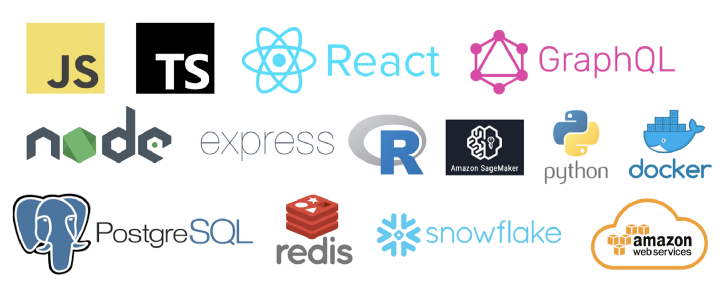
Company values and influencing the culture
As a people person, the team and company culture really matter to me. I can’t handle toxic environments even if they have the smartest people on the planet. I would happily give up the technical learning in exchange for a diverse and healthy team, but it would be pretty awesome if I could get both!
Even though I hadn’t accepted an offer from Convoy yet, the engineering team invited me a few times for lunches, happy hours, and casual 1:1s. I was encouraged to know the people and get a good sense of the company culture. Company values were truly alive in the team, not only posters on the walls. I also learned about a lot of diversity and inclusion initiatives across the company. Everyone seemed happy and passionate. Every time, I came home more excited to join Convoy.
Later after I joined Convoy, I understood what made the team fantastic. Convoy sets a high bar in both technical competency and values fit in their hiring process, which is extremely hard to achieve, especially at such an early company stage. There is zero tolerance for brilliant jerks around here, and that makes it a delightful place to work! And the best part about working at a startup that profoundly cares about culture is having the chance to influence the culture and pave the road for those joining after you.
Trucking deserves better
While exploring startups and finding interesting ones to apply for, I found all sorts of industries. However, it is extremely rare to find an industry that is completely undisrupted by tech. What’s even harder is finding a tech startup innovating in the space and doing it successfully.
Trucking is a very complex industry. Everything that we consume, the food we eat, the furniture we own, and the construction materials of our homes have been on a truck at some point! The number of stakeholders involved in a shipment and the hell of manual and inefficient logistics it goes through is really shocking. By introducing more automation and efficiency in freight, Convoy is fundamentally changing how shippers and carriers do business in an industry that is hungry for innovation and change. From the business side, that’s what made Convoy stand out for me amongst other tech startups I have seen.
Never in a million years would I have thought to end up working in trucking!
It sounded so dull, ancient, and absolutely not technology related, and yet these are the same reasons that make it so ripe for disruption and an exciting domain to innovate.
The transition to Convoy has been a very satisfying career move for me, and I am very grateful for it. However, this is my journey, and it is not intended to be a recipe for switching companies or a one-size-fits-all plan. If you are embarking on your next career move, I encourage you to be deliberate and clear about what you want. Beware of the social pressure and think deeply before following someone else’s path. Depending on your goals, a big company or a small startup might make more sense for you. Make a list of goals. Keep your eyes open. Analyze your options. Take your time. And figure out what works best for you.
Keep on truckin’ 🚚
— Injy Zarif
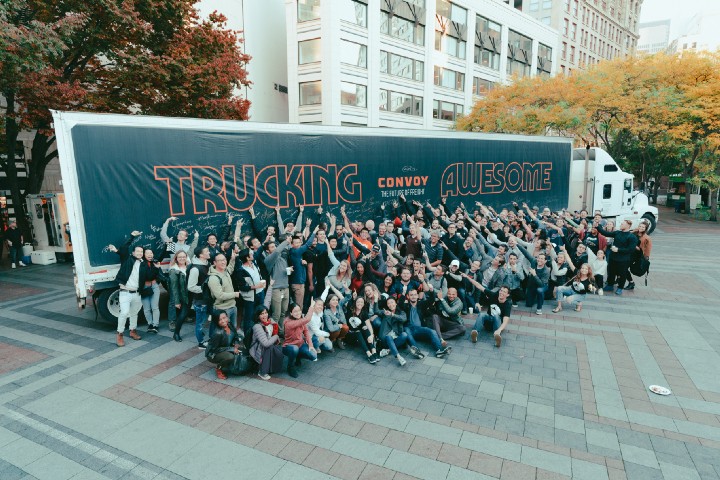
Join a team that’s moving the world forward
Convoy is hiring! Learn more about a career at Convoy.
